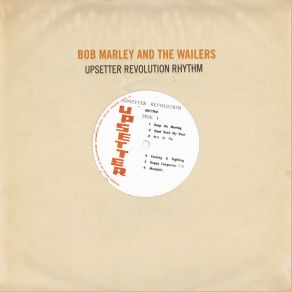Upsetter Revolution Rhythm
Download links and information about Upsetter Revolution Rhythm by Bob Marley, The Wailers. This album was released in 2004 and it belongs to Reggae, Roots Reggae, Dub, Ska genres. It contains 13 tracks with total duration of 36:11 minutes.

|
|
|---|---|
| Artist: | Bob Marley, The Wailers |
| Release date: | 2004 |
| Genre: | Reggae, Roots Reggae, Dub, Ska |
| Tracks: | 13 |
| Duration: | 36:11 |
| Buy it NOW at: | |
| Buy on iTunes $5.99 | |
| Buy on Amazon $9.49 | |
Tracks
[Edit]| No. | Title | Length |
|---|---|---|
| 1. | Keep On Moving | 3:04 |
| 2. | Don't Rock My Boat | 4:30 |
| 3. | Put It On | 3:30 |
| 4. | Fussing & Fighting | 2:27 |
| 5. | Duppy Conqueror (Version 5) | 3:23 |
| 6. | Memphis | 2:07 |
| 7. | Riding High | 2:43 |
| 8. | Kaya | 2:35 |
| 9. | African Herbsman | 2:21 |
| 10. | Stand Alone | 2:01 |
| 11. | Sun Is Shining | 2:08 |
| 12. | Brain Washing | 2:39 |
| 13. | Kaya (Alternate Take) | 2:43 |
Details
[Edit]Co-produced by Lee Perry and Bob Marley, Upsetter Revolution Rhythm is a dub version of Bob Marley & the Wailers' early-'70s album Soul Revolution, Pt. 2. Like Soul Revolution, Pt. 2, it was only issued in Jamaica, though both records were reissued on CD by JAD/Universal in 2004. In its original incarnation, Soul Revolution, Pt. 2 had a simpler sound than some listeners would expect of a Lee Perry production, emphasizing the harmonies on the high end and the throbbing bass on the low part of the spectrum. Upsetter Revolution Rhythm, as was customary for a dub record, essentially removed the vocals to create an instrumental production, although you can still hear some ghostly faint traces of singing here and there, like a memory whose furthest edges have barely escaped erasure. The most interesting feature of this particular dub album, though, is how the rhythm tracks — especially the rhythm guitar lines, which were among the less prominent elements in the mix of the original Soul Revolution, Pt. 2 — are brought to the forefront. Like much dub music derived from prototype vocal tracks, it's not really a match for the original album — the singing and lyrics of Soul Revolution, Pt. 2, which showed the Wailers moving toward a more modern form of reggae both rhythmically and in the spiritual and social focus of much of the words, were some of the most appealing aspects of that record. As they're missing here, what you have are strong early-'70s Jamaican reggae rhythms that, like many dub releases, suit certain moods, but aren't as interesting as the vocal recordings from which they're extracted.